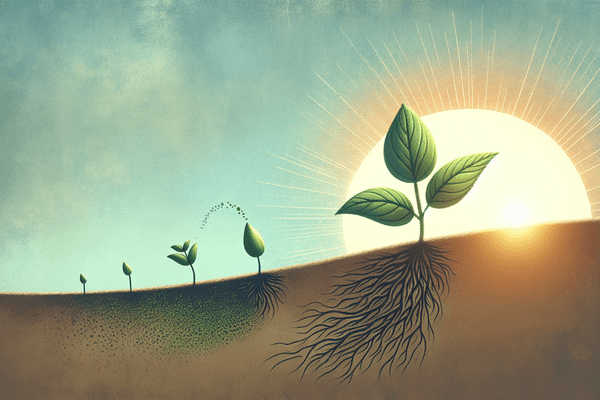The Parable of the Mustard Seed
In the Gospel of Matthew, Jesus tells the Parable of the Mustard Seed, using it as a symbol for the kingdom of heaven's humble inception and its potential for remarkable growth (Matthew 13:31-32). This tiny seed, though seemingly insignificant, grows into a tree where birds find shelter, illustrating how our faith, even when small, can expand beyond our imagination. It is a comforting reminder to believers who feel their contributions are modest. As Jesus further encourages, faith as small as a mustard seed has the power to move mountains (Matthew 17:20). This parable challenges us to see beyond the present, envisioning the vast possibilities that can stem from our humble acts of faith.
The Parable of the Seed Growing
Mark's Gospel provides another agricultural metaphor in the Parable of the Seed Growing (Mark 4:26-29), where Jesus likens the kingdom of God to a seed's mysterious journey from planting to harvest. The man who scatters the seed represents those who spread God's word, doing their part without fully grasping the wonders of its growth. The process unfolds 'first the blade, then the head, then the mature grain in the head', echoing the stages of spiritual development we all undergo. This growth is God's work, and in His perfect timing, the harvest comes, symbolizing the fulfillment of His promises. As Paul writes, 'I planted, Apollos watered, but God gave the growth' (1 Corinthians 3:6-7), we are reminded of our role in God's sovereign plan.
Conclusion
Through the Parables of the Mustard Seed and the Seed Growing, along with the story of Lazarus, we gain a multifaceted view of the spiritual lessons embedded in the Scriptures. These narratives invite us to reflect on the nature of faith, the certainty of God's work in our lives, and the hope we have in Jesus Christ. As we contemplate these biblical accounts, we are encouraged to nurture the seeds of faith within us, anticipate the growth God will bring forth, and hold fast to the promise of resurrection and life. For further reflection on how scripture can guide and strengthen us in our daily lives, consider exploring additional insights that resonate with our experiences and challenges. May these reflections inspire us to live with greater faith, patience, and expectation in the unfolding of God's kingdom.
FAQ
Q: What is the parable of the mustard seed?
A: The parable of the mustard seed, found in Matthew 13:31-32, describes the kingdom of heaven as a tiny seed that grows into a large tree, symbolizing the growth of God's kingdom from small beginnings to great influence.
Q: What is the parable of the seed growing?
A: The parable of the seed growing, found in Mark 4:26-29, compares the kingdom of God to a man scattering seed, which grows into a harvest, representing the mysterious and gradual growth of God's kingdom in people's hearts.
Q: How does the story of Lazarus reflect Jesus' power over death?
A: The story of Lazarus in John 11 demonstrates Jesus' power over death by showing how He resurrected Lazarus after four days in the tomb, offering hope and affirming His claim as the resurrection and the life.
Q: What does the mustard seed teach us about faith?
A: The mustard seed teaches us that faith, even if small, has great potential to grow and make a significant impact, encouraging us to trust in God's ability to work through our seemingly modest beginnings.






